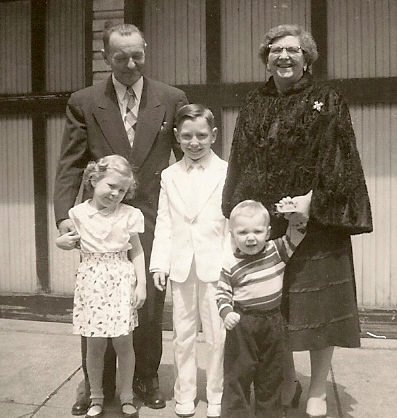|
The Feast of Corpus Christi in my parish was little more than a rumor last night, for this weekend seemed to be, in the words of the immortal Michael Corleone, a time “to settle all family business” before the doldrums of summer set in. So, we had no sermon, the baptism of several babies, a seminarian’s farewell, an altar server’s farewell off to college, and an unfortunate sound system anomaly that cut out every third word. The hymns were all copyrighted after 2000 and none drew from very rich treasury of Eucharistic hymnody dating back to the great Thomas Aquinas himself. It is always a mystery to me how the Church’s greatest theologian also composed possibly its greatest hymn. If you need a good lift today, Aquinas’s Pange Lingua can be found at this sponsored site on YouTube. Ironically, this hymn was written specifically for the Feast of Corpus Christi, which was established in the thirteenth century.
It occurred to be the other day that this past May 20 marked the 59th anniversary of my own First Communion. In all honesty I recall the event with a minimum of “gushiness.” I remember the great preoccupation of all the adults about me that we get this “right.” We rehearsed a number of times, and we shopped till we dropped to find a starched white shirt that fit. It didn’t, really, and I was uncomfortable the whole day. (And it was really uncomfortable a few weeks later for the outdoor Corpus Christ procession.) I actually got scolded at home after the Mass for walking too slowly back to my seat after receiving the Eucharist. I think that, like many of my generation, I developed a touch of cynicism about religious practice and adult agendas that in the long run has inoculated me from excessive heartbreak. I will say, though, that my second grade teacher, Sister Mary Anne Therese, was the most level headed adult involved in my faith formation at that stage. She taught me about the Eucharist in a very healthy way and avoided the pious outlandishness of some of the texts in use. (Some texts, sadly, were anti-Semitic, featuring fictitious Jewish medieval desecrations of the hosts that reportedly “bled real blood.”) She was also an innocent party to one of the more disillusioning moments of my catechesis. Knowing that we had great curiosity about Jesus’ house, the tabernacle, Sister Mary Anne must have wrangled permission for us to actually look inside a third tabernacle in our church presently not in use. (Yes, we had three tabernacles, and did use two on Sundays.) This was my “Raiders of the Lost Ark” moment of religious instruction; I got on a stool and looked in, half-expecting to see little angels singing Pange Lingua. What I actually saw was once white linen lining that was severely water stained; this tabernacle had not been opened in years. What saved my First Eucharistic experience was actually the second one. We had Monday off from school, but I got up on my own and went to the earliest Mass on the daily schedule, a Mass attended by a few elderly souls and some blue collar workers, and took my place at the communion rail with no outside pressure. I said my prayers at my own pace, and today I honestly think of that Monday dawn Mass as my first communion. Whatever inspired me to do that is probably the same divine force that has kept me in the Church and receiving the Eucharist when my own humanity and the Church’s makes that hard to do, One of the most important challenges of religious education and faith formation is creating the mindset where life without the Eucharist is an impossibility. I am struggling here to find the best wording; maybe there isn’t one. Yes, I have imagined life as a member of another Christian assembly. (I have a perfect Lutheran temperament, but no Pentecostal inclination.) But it is extremely hard to imagine a life outside the wondrous liturgical cycle of the celebration of Jesus’ word and feeding that is our Mass. One of the true gifts of my life was the opportunity to live for five years in a Franciscan community of scholars who understood the Scriptures and the Sacraments in such a way that their presiding over the sacred rites was truly life-giving. One of the major crosses of anyone who studies theology—and this certainly includes catechists, school teachers, church ministers, or any Catholic who explores our Tradition—is the discovery of what it is we really do as a Church. If you take the time to unpack today’s Gospel, for example, from St. Mark, and explore the acquired wisdom of Church Tradition of what the Last Supper Passover and Jesus’ words truly mean—you will find that what was once routine is now “the pearl of great price.” You will be restless and out of sorts with what looks like business as usual in local parish life. But you’ll never leave your parish…because your heart will be burning inside you to share what you have discovered. The word we’re looking for? Evangelization: explaining the menu of the Eucharistic banquet.
0 Comments
Leave a Reply. |
On My Mind. Archives
July 2024
|

 RSS Feed
RSS Feed